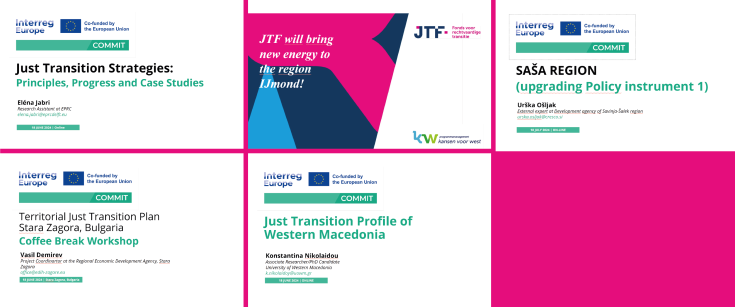Inside the Coffee Break Workshop: Recap & Insights!
In June, the COMMIT project held its inaugural Coffee-Break Workshop, bringing together participants in an online forum dedicated to knowledge exchange. The focus? Exploring how Just Transition Strategies drive goals for SME ecosystems in industrial transitions. The diverse group included project partners, stakeholders, and the wider public, all keen to share insights and strategies.
See the video in our website library, or watch it here!
EPRC Delft kicked off the session with an introduction on the EU’s Just Transition Fund (JTF) and its strategies, highlighting the principles guiding the EU’s approach and the current status of these strategies. Case study presentations explored real-world examples from project partners, offering contextual insights into their strategies, governance approaches, the challenges they face, and opportunities to increase access to skills, finance, knowledge, and innovation. Curious to find out more? Read on!
Access to Skills: IJmond, The Netherlands
Partners from Kansen voor West detailed their efforts in IJmond, focusing on reducing high CO₂ emissions and leveraging regional strengths like a robust labour market and manufacturing sector. The JTF IJmond aims to:
Collaborations with institutions such as NOVA College play an important role in ensuring a resilient workforce, with projects like Training Vouchers for Wind and Hydrogen and Women in Technics boosting SME access to skills and promoting inclusivity.
Access to Finance: Stara Zagora, Bulgaria
Bulgarian partners presented the Stara Zagora district's approach, heavily impacted by its coal-fired power plants. The region’s Transition Action Plan focuses on sustainable energy, social support, and economic diversification, managed by the newly established Energy Transition Commission. Key investments include:
These investments aim to ensure financial support for SMEs and promote a skilled workforce ready for new economic demands.
Access to Knowledge: Western Macedonia, Greece
Partners from the University of Western Macedonia highlighted the Greek region’s journey from coal reliance to a diversified economy. The region's strengths include a skilled workforce, solar potential, and a strong agricultural sector. Key initiatives include:
These institutions drive research and innovation, crucial for SME growth in the post-lignite era, promoting skill enhancement, sustainable energy solutions, and circular economy practices.
Access to Innovation: SAŠA Region, Slovenia
Slovenian partners discussed the SAŠA region’s transition from coal dependency to carbon neutrality by 2033. To realise this aim, the region’s manufacturing base and role in energy production provide a solid foundation for sustainable industries. Key initiatives focus on:
These efforts aim to enhance SME innovation and competitiveness, foster knowledge exchange, and ensure a smooth transition to a sustainable, low-carbon economy.
In the coming months and years, the COMMIT project will continue to explore ways of supporting local and regional authorities in developing an SME ecosystem for the industrial transition. So stayed tuned for more updates!
